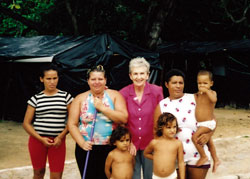An Exodus story
After living in tents by the roadside, 300 families have moved onto land that is now their own
By Sr. Clarice Garvey, O.L.M.
Summer 2005
Return to Table of Contents
Print Article
It was the red tablecloths covered with white lace, spread diagonally across the long tables that got to me. It was as if nothing was too much for this thanksgiving celebration. The people had spent days and nights in temperatures simmering around 35 degrees, in downpours of rain for days on end, living in plastic tents, enduring abuse and threats shouted at them by passersby. Now they were giving thanks to the God who accompanies them in their struggle for a piece of land on which to live.
"Not one of our children was sick the whole year long. Not one!" stressed a grandmother with several small children playing around her. "We are so grateful. We trusted in God and we were not disappointed."

Sr. Clarice Garvey with members of a community of 300 families who had camped under black plastic tents on the roadside for more than a year while awaiting legal possession of land.
More than 300 families were celebrating the completion of their first year camped along the roadside. They were there awaiting the completion of an agreement between the federal government and the company that owned the 14,000-hectare property the families hoped to move onto. They had invited us, the archdiocesan land pastoral team, to share this moment of celebration with them.
November 5, 2003, had been marked as "Day One" of their year-long encampment, and every day after that was numbered and checked off on bits of paper, each taped to a post that supported the black plastic wall of one of the tents. Now that the year was up, preparations for the celebration were underway.
Since some of these families lived as tenant farmers on nearby land, they had maintained their homes and animals even as they camped. Now was the time to slaughter the fatted calf, the pig and the chickens. The men dug fire pits into the sand and built fires. Over the pits, they laid wooden skillets loaded with chunks of meat and a "5 Star Bar-B-Q" sign went up on the nearest pole.
The women did the rest. They had vegetable and fruit salads, beautifully decorated with whole ripe caju (cashew) and bunches of fresh parsley. There were mounds of baião de dois (beans and rice) – a festive specialty – along with watermelon, mango and papaya. There was nothing missing and plenty of what they had, literally enough for an army. And an army it was, about a thousand people, lined up at several serving areas.
The day's celebration had begun with the Eucharist presided over by the local pastor. It was a mass of thanksgiving for God's care during the year, and for the courage and perseverance that kept them together. Throughout this time they continued to believe and hope that one day they would live on the land they had watched for one long year, they would care for it, and the land in turn would give them life.
The priest reminded them of Jesus' words to his followers: "You will do great things." He told them that what they were doing, freeing the land from neglect and abuse, was indeed a great thing. The people spoke of Moses and likened their journey to the Exodus story – a journey through the desert – and the many signs that God was with them on their journey to this Promised Land.
Writing about this event now, four months later, I am pleased to be able to complete this story, a glorious victory. On February 28, 2005, the families literally picked up their tents and moved onto that land. When the legal documents are signed and the officials have returned to their offices, you can be sure there will be another celebration, one that only the people can imagine. They trusted and were not disappointed. Thanks to God who walked in the garden of this Earth and saw that it was good.
This year, the Archdiocese of Fortaleza, Brazil, will celebrate the 30th anniversary of the inauguration of the committee, Pastoral Work With The Land. It will be great to see many of the members of the original land pastoral team and the many teams since. Our Lady's Missionary Sr. Maejanet MacDonell (1931-2004) will be remembered in a special way for her compassionate and prophetic contribution to the liberation of the land for the use of the people who need it and care for it.
Return to Table of Contents
Print Article